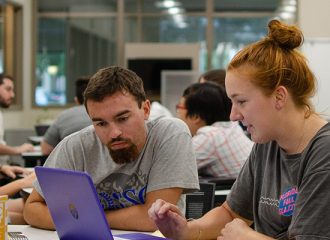by Adam Johnson
On the first floor of Trevor Colbourn Hall, lined with large windows, lies the UCF University Writing Center, its tables and whiteboards occupied by students. It’s certainly a change from its previous location, tucked away behind a staircase at the old Colbourn Hall. Some writers are here for class credit, and others just want another set of eyes on their papers. A handful are at the computers, using the space as a study spot, and sometimes there’s a group in the back finalizing a collaborative project. Undergraduate and graduate peer consultants are at the ready to help writers, not only with the concerns and priorities but also with strategies, tips, and resources they can take with them and apply to other projects. The Director of the Writing Center, Dr. R. Mark Hall, sits in his office, observing it all through a window in the wall—as he is apt to do.
A Place of Opportunity
When Dr. Hall began working in writing centers thirty years ago, he was a tutor and an English literature major at Emory University’s Oxford College. When he took his graduate school assistantship at the University of Alabama WC, his focus was still on English. Despite this path to professorship, he was terrified and nervous about teaching to a large crowd. In a way, the writing center was his safe space, an opportune place to get his “sea legs.” But while he spent years in writing centers, it never occurred to him that there was the possibility to study composition—let alone teach it. It wasn’t until an Alabama professor told Hall, “You don’t actually want to teach writing.” What Hall heard was just the opposite, “You can actually teach writing!”
Writing studies was Hall’s bliss—the reading and writing people enjoy “that school seems to kill.” Hall proceeded to get a series of jobs teaching writing, and then a PhD in Rhetoric, Composition & Literacy Studies at the University of Louisville. But he still had his doubts when, while teaching at California State University, he was asked by the university’s WC director to succeed her, so she could spend more time with her child. The only reason he agreed to accept was he respected her so much, although he wasn’t sure if he would stick with it. But she knew.
His biggest takeaway from shadowing her was “that student tutors… could have a great deal of agency in how that place was run and that they could participate… in primary research, that they could go to conferences, that they could present their work, that they could take on leadership roles, and mentor other tutors.” His mentor’s tutors rose to that expectation, and he continues to give his UCF tutors that same agency. If one mission of UCF is to offer the best undergraduate education, Hall believes tutors need to be attended to in this regard just as much as the writers.
To do this, he requires students in the Theory of Tutoring course, ENC 4275 to participate in consults during the first semester, so they can learn the research and train. They reflect on their individual and collective tutoring practices through case discussions, observations, transcript analyses, and weekly meetings. Over the following semesters, they receive ongoing professional development, participate in inquiry projects, tutor online through Adobe Connect, and engage in research opportunities – which are becoming more lucrative in writing studies. For example, two undergraduates Hall worked with presented at the national Conference on College Composition and Communication. After they presented their research and extensively discussed the ideas of Nancy Grimm (author of landmark text Good Intentions), Grimm herself invited them to publish their work in her next book project (“And I was sitting next to them, and I too had presented my work in the same panel, and Nancy Grimm did not ask me to publish my work!”) Yet, he was more gratified and excited for his students. Similarly, Melissa Ianetta, co-author of The Oxford Guide for Writing Tutors, wants even more student-led research in the next edition of the book. In fact, she visited the writing center in November 2017. The opportunities for student tutors has exploded.
A Place of Learning
“I don’t know if you get this impression, but it’s a thing,” he tells me, with a smirk and a drawl. “Despite the growing opportunities, there are still hurdles for writing centers to overcome, including their reputation in the Discipline of Writing & Rhetoric. We are the lowest of lows.” Beginning with English studies, writing centers were established by women who were underpaid or unpaid wives of literature professors. Most of the time, the centers were (and still are) relegated to closets, basements, and backrooms. ”
It was “a sign of remediation,” not the place of learning where all writers should go for feedback. But even as writing center directors around the country have tried to combat this characterization, the discipline of writing studies still looks down on writing center research. As a consultant, I wondered why writing studies, already seen as lower than English, would frown upon this sub-discipline. Dr. Hall tells me that “historically, writing center research is regarded as sometimes somewhat shallow.” In an effort to be recognized more by their discipline, these researchers have made a turn to more rigorous studies—empirical, agreeable, and data-driven. Meanwhile, Hall gives his students the space to become researchers by introducing the work as research through inquiry projects and the course. What consultants learn from these opportunities informs their tutoring practices, especially after discussing their findings and self-reflections with their co-workers.
But what does learning look like? For writers, this seems obvious: new strategies, skills, resources, planning, even some new insight on how to utilize the space. For consultants, though, “they take away so many different things”—work-related and interpersonal skills, development as a writer and a teacher. There’s also personal change. Tutoring can positively change relationships, the way a consultant talks with their partner, or the way they just listen at work and at home. Even if a tutor doesn’t continue with writing studies, the experience still has its perks. For example, a UCF finance major and former tutor has since joined a top-five accounting firm in Miami and leads a team there. Hall said the alumnus believed the teaching experience from the center was important to earning that position.
Don’t just take their word for it. A couple of research projects have sprouted from this line of inquiry, including the Peer Writing Tutor Alumni Research Project. In the article “What They Take with Them,” by Bradley Hughes, Paula Gillespie, and Harvey Kail, they found that “Respondents assert that they developed a new relationship with writing, analytical power, a listening presence, skills, values, and abilities vital in their professions…[and] in families and in relationships, earned confidence in themselves, and a deeper understanding of and commitment to collaborative learning.” Regarding professions, the writing center develops former consultants’ communication and active listening skills, as well as analytical and organizational skills “essential to the development of careers in nearly all fields.
“I love watching students like you come through this space and discover this work,” Hall tells me earnestly. “I think it’s an enormous honor and a privilege to watch students learn and see what happens, because you are changed when you work in this place. And I love to watch that… If you want to understand what learning looks like, this is a laboratory for watching that happen.”
“It sounds funny now,” he says, smiling to himself. “I watch our undergraduate majors in writing and rhetoric and I watch our grad students in writing and rhetoric, and I think, ‘Wow! When I was in your shoes, I didn’t even know this was a field.’ It’s just changed so much—for the better.”
A Place of Possibility
Sitting in the new space, it’s crazy to think how much the place has evolved with a continuous possibility of improvement and growth. Founded in 1999 by Department of English professor Dr. Beth Young, it was first “temporarily” housed in a triple-wide trailer. It ended up staying in that space until 2012, after Hall was hired as director and President Hitt supported its move to Colbourn as part of the Center for Writing Excellence. What hasn’t changed is what tutors take with them. For one tutor, working here made her more empathetic, for another, a better person. To others, it was their community, full of their best friends.
The Writing Center even extends beyond the walls of Trevor Colbourn Hall, with consultations taking place at the Main Library, the Rosen campus, and online through Adobe Connect. This spirit keeps it a place of new opportunities for students to grow as writers and researchers. It promotes all sorts of collaborative learning, and it fosters the possibility to improve, starting from any point in the writing process for any active UCF student. Whether as a writer or someone interested in becoming a consultant, you can make this your place, too.




